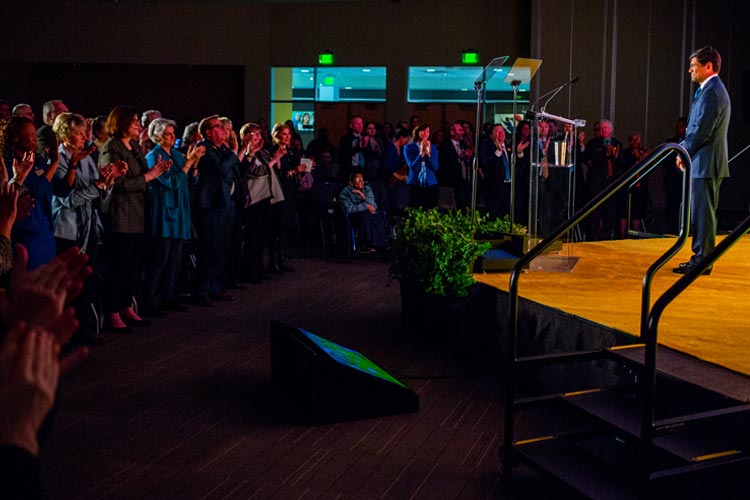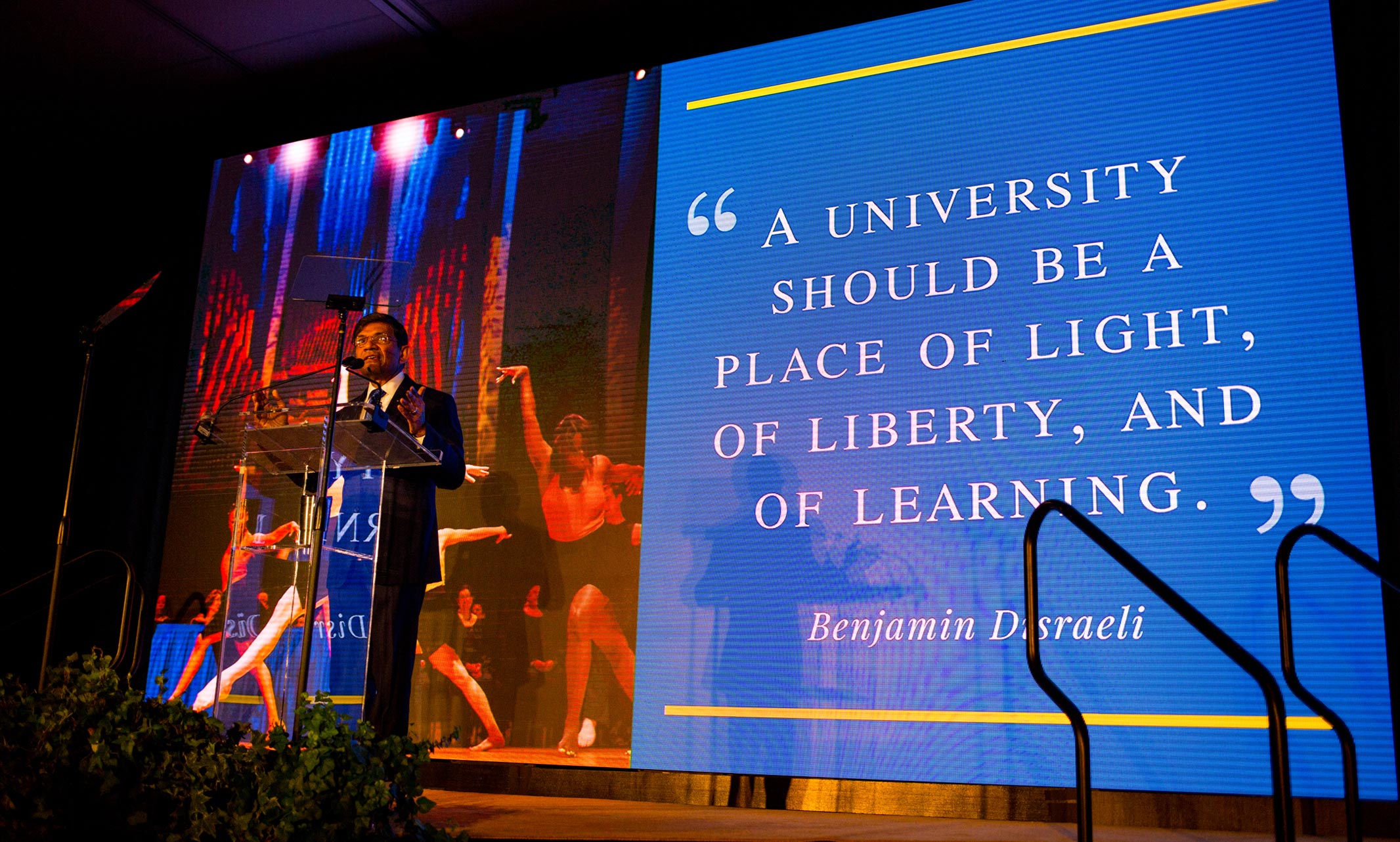Students, faculty, staff and the Kansas City community gathered to celebrate the investiture of Mauli Agrawal, Ph.D., as the ninth chancellor of the University of Missouri-Kansas City.
Agrawal took the opportunity at the ceremony — his university inauguration — to share the vision for UMKC that he has been crafting for the past nine months.
“A university should be a place of light, of liberty and of learning,” he said, quoting Benjamin Disraeli. “…That vision calls for all of us to make the commitment to be not only a Place of Light but also become a Community of Excellence.”
So what’s a Community of Excellence? Agrawal referenced a biography about philanthropist Henry Bloch, founder of H & R Block, who has given generously to Kansas City and UMKC.
“’The person who succeeds is the one who does his or her own job, and then some; who is thoughtful to others, and then some; who meets obligations and responsibilities, and then some. That’s the person who steps ahead of the crowd and goes on to great heights,’” Agrawal quoted. “That is the philosophy we must live by to become a Community of Excellence; that is the culture we must grow here at UMKC. The path to excellence is not very complicated — it is as simple as truly living the culture of ‘and then some.’”
Agrawal introduced five signature initiatives — each aligning with the new UMKC Strategic Plan 2018-2028 — that help provide a path to excellence.
Student Success: Roo Strong
Provost Barbara Bichelmeyer and her team have introduced Roo Strong, a new student-success model. It’s a personalized plan for education and support that makes these commitments:
- We will meet each student exactly where they are.
- We will assess, but not assume or judge.
- We will treat each student as a member of our family.
- We will engage each student with learning experiences and co-curricular supports to meet their unique needs.
- We will provide each student with constant guidance and feedback.
- We will help each student take responsibility for their personal progress, their education, their decisions and their futures.
Research: UMKC IDEAS
Agrawal introduced the UMKC Institute for Data Education, Analytics and Science, or IDEAS for short.
The vision of the institute is to position UMKC as the top option for data science education, research and service in the region, building on the university’s strengths in biomedical informatics, big data analytics, image analysis, natural language processing and geospatial analysis.
The coordinator of the new institute is Brent Never, associate professor of public affairs at the Henry W. Bloch School of Management. Never is a “civic hacker” who uses city data to analyze abandoned housing, and was interviewed about his work last year by Lester Holt on NBC Nightly News.
Professional Education:
UMKC TalentLink
Individuals enrolled in UMKC TalentLink will not pursue a traditional degree but will work to earn badges, stackable certificates and other new forms of credentials that are evolving in the 21st century. Sarah Morris, the new executive director of informal and continuing education, is leading the development of the initiative.
Healthy Communities:
UMKC Health Equity Institute
Jannette Berkley-Patton, associate professor in the UMKC School of Medicine, will lead a new initiative to ensure that individuals and families in the Kansas City area have equal opportunities for improved health and well-being. The Institute will use UMKC research and outreach to identify, quantify and address health care gaps in our neighborhoods.
Berkley-Patton is a national leader in African American health research. One of her noted projects, Taking It to the Pews, was funded with a $3.2 million grant from the National Institute of Mental Health to assess HIV testing. She is the director of the UMKC Community Health Research Group, which supports collaborative community research, and provides doctoral and undergraduate training in community participatory research. She collaborates with networks of churches in her health research in Missouri, Kansas, Alabama and Jamaica.
Building Pride: Mentorship
Several new faculty and staff mentorship and support programs are underway, including “Talk It Up,” focused on career and professional development.
“This commitment to our people is truly foundational,” Agrawal said. “It is the rock on which everything we hope to achieve will be built...More than anything, I want our people to be as proud of themselves, and our university community, as I am proud of all of you. And we have a lot to be proud about. Look around Kansas City.”
- Where you see urban education succeeding against long odds, you see Roos.
- Where you see the sick being healed and new cures being discovered, you see Roos.
- Where you see the innocent being freed from unjust imprisonment, you see Roos.
- Where you see communities reducing crime and neighborhoods organizing to improve, you see Roos.
- Where you see burgeoning opportunity in engineering, science and technology, you see Roos.
- Where you see the arts flourishing and enriching lives, you see Roos.
As you have no doubt been reminded lately, Roos really are everywhere, and they excel everywhere.


